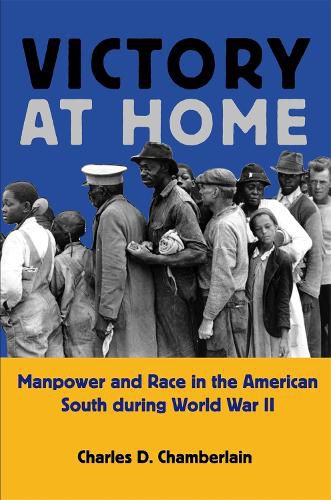Readings Newsletter
Become a Readings Member to make your shopping experience even easier.
Sign in or sign up for free!
You’re not far away from qualifying for FREE standard shipping within Australia
You’ve qualified for FREE standard shipping within Australia
The cart is loading…






Victory at Home is at once an institutional history of the federal War Manpower Commission and a social history of the southern labor force within the commission’s province. Charles D. Chamberlain explores how southern working families used America’s rapid wartime industrialization and an expanded federal presence to gain unprecedented economic, social, and geographic mobility in the chronically poor region.
Chamberlain looks at how war workers, black leaders, white southern elites, liberal New Dealers, nonsouthern industrialists, and others used and shaped the federal war mobilization effort to fill their own needs. He shows, for instance, how African American, Latino, and white laborers worked variously through churches, labor unions, federal agencies, the NAACP, and the Urban League, using a wide variety of strategies from union organizing and direct action protest to job shopping and migration. Throughout, Chamberlain is careful not to portray the southern wartime labor scene in monolithic terms. He discusses, for instance, conflicts between racial groups within labor unions and shortfalls between the War Manpower Commission’s national directives and their local implementation.
An important new work in southern economic and industrial history, Victory at Home also has implications for the prehistory of both the civil rights revolution and the massive resistance movement of the 1960s. As Chamberlain makes clear, African American workers used the coalition of unions, churches, and civil rights organizations built up during the war to challenge segregation and disenfranchisement in the postwar South.
$9.00 standard shipping within Australia
FREE standard shipping within Australia for orders over $100.00
Express & International shipping calculated at checkout
Victory at Home is at once an institutional history of the federal War Manpower Commission and a social history of the southern labor force within the commission’s province. Charles D. Chamberlain explores how southern working families used America’s rapid wartime industrialization and an expanded federal presence to gain unprecedented economic, social, and geographic mobility in the chronically poor region.
Chamberlain looks at how war workers, black leaders, white southern elites, liberal New Dealers, nonsouthern industrialists, and others used and shaped the federal war mobilization effort to fill their own needs. He shows, for instance, how African American, Latino, and white laborers worked variously through churches, labor unions, federal agencies, the NAACP, and the Urban League, using a wide variety of strategies from union organizing and direct action protest to job shopping and migration. Throughout, Chamberlain is careful not to portray the southern wartime labor scene in monolithic terms. He discusses, for instance, conflicts between racial groups within labor unions and shortfalls between the War Manpower Commission’s national directives and their local implementation.
An important new work in southern economic and industrial history, Victory at Home also has implications for the prehistory of both the civil rights revolution and the massive resistance movement of the 1960s. As Chamberlain makes clear, African American workers used the coalition of unions, churches, and civil rights organizations built up during the war to challenge segregation and disenfranchisement in the postwar South.